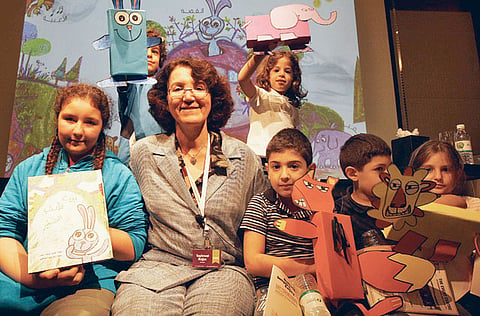Children's favourite
Taghreed Najjar has put a mythical monster into the limelight

Taghreed Najjar is the woman who gave the Arab world its very own "monster". The Palestinian-Jordanian writer is the author of 28 Arabic picture books for children, including Al Ghoul (The Monster), which she wrote after deciding it was time for youngsters in the Middle East to follow literary creations from the region in which they grew up.
Al Ghoul has since been turned into a short animated story on the Arabic version of Sesame Street, a famous children's TV series from the United States. But Najjar acknowledges that Al Ghoul was a controversial piece of literature at the time.
She said: "Al Ghoul, meaning monster, is a part of Middle Eastern culture and it is prevalent in many people's psyche. But for a long time it had a very bad reputation because in olden days Al Ghoul was used as a disciplinary method to scare children into obedience. Educators started frowning upon Al Ghoul stories and parents did not accept them.
"As a writer, I began to notice our children started becoming attached to other people's monsters. It was OK for everybody that they related to monsters and fictional characters from other countries. But they still refused to use ours in literature even though we utilised them in any way we wanted.
"I wrote about Al Ghoul using basic story elements. The hero's name was Hassan and in ancient Arabic culture Hassan is always the hero, the real boy who overcomes all the hurdles and gets the princess. Some teachers refused to even look at the story because of the title. They thought it was a scary story.
"But when Hassan faces Al Ghoul he realises the monster is just as scared as he is. When Hassan asks, ‘Why are you so scared of me?', it replies, ‘Because you have two eyes and you do not have hair all over you.' Al Ghoul is scared because Hassan looks different.
"Many people like the message in the book because it is not about being scary; it is about accepting differences. I think Sesame Street saw that and that is why they adapted it for TV."
Najjar, a former teacher, now runs her own publishing company in Jordan called Al Salwa. Previously, she headed the publishing department of a children's cultural centre. Najjar's most notable works include the Al Halazone series, Who Hid the Eid Lamb? and A Home for Arnoub.
Many of her books are used as supplementary reading in schools but she stresses that was not her initial intention while writing.
She said: "At one point you want your books to be used for education. But as a writer, you do not want your work to be used solely within the school curriculum and to be thought of as books written just for the classroom. It is a tricky balance that I am trying to achieve. I started with the idea that this kind of writing was very much needed in the Arab world. We did not have supplementary reading and the school curriculum in Jordan was very dry and boring for children. I thought my books would be a good way to help teachers who did not have access to relevant materials.
"The most important thing is that my writing is based on a storyline. I always keep my writing fun as it is crucial not to fall into the trap of writing a textbook. I had such a close and intimate experience with books as a child.
"They gave me so much pleasure and were such an important part of my life. I wanted to give that [same experience] to children. I want to be a part of their memories.
"My inspiration comes from subconscious memories. As a child I loved to read stories and I loved to listen to stories. I remember images and I remember my feelings while listening to certain stories such as excitement and fear. I also wanted to keep [Arabic] culture alive."
Najjar also believes the Arabic publishing industry has improved "tremendously" since she entered the business more than 30 years ago.
She said: "Governments and NGOs have made a huge difference because you need people to back you. People need to realise what you do is important. This message filters through schools, parents and families and makes a difference. People with a writing talent begin to think it is worth writing their own book. It is a circle.
"In the UAE, not much attention is given to Arabic literature. Many people here will come to see a renowned international author but Arab authors do not yet have the ‘star' factor."
Najjar may think she does not have the "star" factor but legions of children across the Middle East might well disagree as they learn the lessons of life through their very own "monster".


